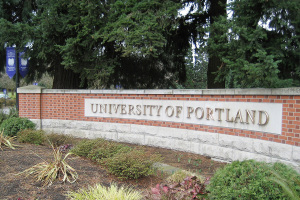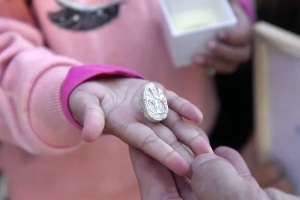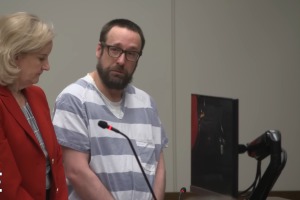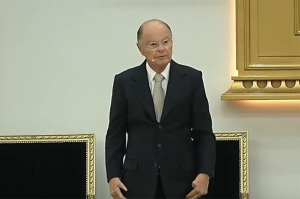‘Keep the gate open’: Latin American leader shares hopes, expectations for Lausanne 4
Lausanne 1 ‘opened the gate.' Will Lausanne 4 keep it open?
Steuernagel went on to highlight Lausanne 1 as a historic moment, “a kind of opening of the gate” that articulated “an Evangelical identity and stance that represented all Evangelicals and proved relevant to the lived reality.”
The Gospel of Jesus Christ as the good news was affirmed, and it was highlighted that the Gospel should be proclaimed everywhere and at all times as universal and sufficient, and “in such a way that people can recognize Christ in us.”
In addition to these foundational truths, however, Steuernagel highlighted that the Lausanne Covenant also emphasized that the Scriptures “must be embraced in their entirety. Hence the expression ‘the whole Gospel,’ necessitating a departure from any reductionism, segregation or dilution of the Scriptures.”
It also affirmed Jesus as the center determining all areas of life. “Hence the expression ‘the whole Gospel for the whole person.’ Therefore, any separation between body and soul, individual and community, present and future is rejected, as it would be a denial of both the Gospel and humanity.”
These and other affirmations led to joy and expectations but also tensions, Steuernagel said. The presence of God and the breath of the Spirit was felt, which “led the Church to a new moment of fellowship, integration and assimilation of new leadership and voices.” There was anticipation of the Church waking up to its true calling.
At the same time, there was tension because the “more customary leaders were no longer the only ones” who could express their perspectives. Certain biblical interpretations as well as some of the mission and strategic agendas seemed less relevant or in need of reassessment. And “new leaders, especially from the Global South, were emerging and wanting to sit at the table and have access to the microphone.”
Despite fluctuations of the years and changes in Lausanne’s leadership, Steuernagel said the gate that Lausanne 1 opened “did not (completely) close again.”
Padilla and Escobar are illustrations of the tension as they represented the “new and surprising voices at Lausanne 1” but then “did not have the same space, neither personally nor in terms of the proposed agenda, at Lausanne 2.” At Lausanne 3, however, the iconic figures returned and were “recognized and affirmed,” Steuernagel said, adding: “The ‘gate’ remained lifted.”
Looking ahead at Lausanne 4 considering these past dynamics, “the question is whether it remains open,” Steuernagel said.
He wonders if there will be room for new voices, emphasizing that “there are new voices” to be heard. And he asks if there will be space for surprise.
“Surprise that bears the mark of the Spirit and leads the Church to rethink its missional experience based on a new encounter with the scriptures, a necessary conversation among churches from everywhere and in every place, and a new reading and appropriation of the context we live in,” Steuernagel said.
“If the Spirit blows, there will be surprise and there will be tension, and this is something we should know and accept.”
Lausanne 4 must reaffirm the Evangelical identity in today’s context
Steuernagel emphasized that a key outcome of Lausanne 4 must be the reaffirmation of the Evangelical identity in consideration of today’s context so that the Church’s testimony will be relevant and effective.
“Christian faith gives birth to identity,” he said, but cautioned that this identity is “never abstract, conceptual or theoretically doctrinal.” Instead, it is “always communal and relational.” Furthermore, while the Christian identity does not depend on the context, it does not assert itself without a context either.
It is “nourished and inspired by the identity of the God of revelation and incarnation.” And He is “the only God who makes Himself known.”
“He is the God with a name — the God of our fathers and mothers, the God of Jesus Christ; has a presence — the Jesus of Nazareth; and has an address — Galilee, Jerusalem, Judea, Samaria, and even to the ends of the Earth,” Steuernagel said. “Each of these places needs to be identified, encountered, named, respected, loved, and established in common coexistence.”
He adds that the Christian faith identity “takes shape in the experience of vocation through which God calls us to Himself and sends us in His name.”
“Identity is always missional because God is always missional; He is the God who goes out of Himself, meets the other, and reveals Himself as the God of love. He is the incarnate God who calls us to sit around Him, as He did with the disciples (Mark 3:14-15), and from this place shows us the way: ‘go’; indicates what must be lived and what must be done: proclaim the Gospel, heal the sick, and cast out demons (Mark 3:14-15, Matthew 10:1).”
Steuernagel believes one of the most significant affirmations of Lausanne 1 was that identity and context go hand in hand. But the identity that was formulated was clearly Evangelical and therefore clearly distinguished itself from the ecumenical Christian world that was marked by “a tendency towards a more liberal and political theology.”
“In Lausanne 1, the Evangelical identity was affirmed, and that was the direction Lausanne wanted to take,” he said. “By the time Lausanne 3 took place in Cape Town, South Africa, the context had changed, but the Evangelical identity would be reaffirmed.”
Steuernagel felt that Lausanne 3 affirmed an identity and mission paradigm that was marked by the language of love. This was a noticeable shift from the previous language that focused on discerning tasks, programs and resources.
Lausanne 3 and the resulting Cape Town Commitment recognized “that many times in the past, our attitudes and missionary practices were marked by a divisive spirit, a belligerent attitude, and conquest goals, sometimes enveloped in colonialist and civilizing practices,” he said.
“Now, we were saying that it was necessary to convert to the language and attitude of love and the practice of welcoming and caring, so that new generations and communities may believe, and with them, we become an expression of the Body of Christ. Believing in a loving God. A caring and trustworthy God. A God of shalom.”
Fourteen years after the Cape Town gathering, Steuernagel said it is necessary to reaffirm the Christian identity again at Lausanne 4. “And we need to do it in harmony with the breath of the Spirit that leads us to listen to the voice of God anew and to do so prophetically in the time and context in which we live.”
Doing so is important because identity is not something that is inherited, rather it comes “as the fruit of conversion.”
“Identity needs to find its space for testimonial gestation in each generation and in each context because our identity is not disconnected from our mission. Identity is a missional affirmation,” Steuernagel stated.
He described how the process leading to Lausanne 3 included a season of listening and discerning the challenges of mission in the first decade of the new millennium. Similarly, participants in Lausanne 4 must “once again discern the time and context, as well as internal and external challenges and opportunities that require us to affirm our identity in firm and loving testimonial conversations.”
Christian Daily International provides biblical, factual and personal news, stories and perspectives from every region, focusing on religious freedom, holistic mission and other issues relevant for the global Church today.





























